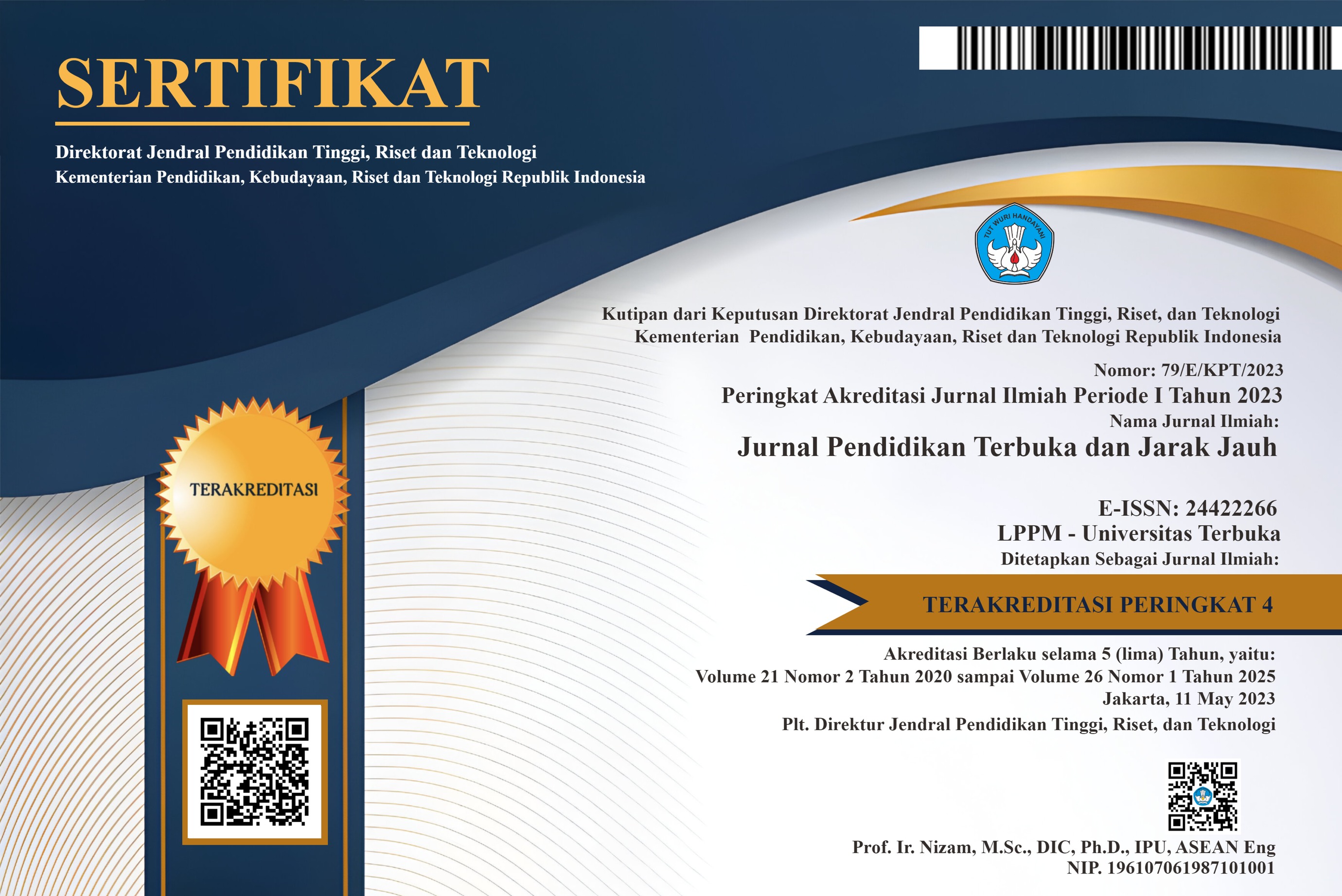STUDENTS PERCEPTION ON QUALITY ASSURANCE SYSTEM OF DISTANCE EDUCATION AT UNIVERSITAS TERBUKA
Keywords:
jaminan kualitas, open and distance learning, pembelajaran terbuka dan jarak, persepsi mahasiswa, quality assurance, student perceptionAbstract
This paper addresses the Universitas Terbuka (UT) students perception on quality assurance (QA) system of distance education, using an online survey method involving 306 students. The UT students perception on QA system is analyzed in terms of profile of respondents, perception on important values of QA, students satisfaction on the quality of the distance education programs and courses. The profile of the respondents shows that most of them are within the age of 25 to 30 years old. They study at UT mostly by means of reading printed materials and interactive online studies at home and at no particular place in the evenings. Students difficulties in distance related to conflicts with work responsibilities, lack of time and self motivation. Students said that they needed both academic and social psychological support. Students perception on important values in QA was expressed in terms of the availability and clear guidelines for QA system in the institution. In terms of institutional credibility, students stated that external accreditation and qualified staff are key factors to institutional quality. In terms of learning process, students valued highly the importance of well structured courses and interactivity in the learning process. Students also stated that media technology supports, faculty support, and fair assessment are important in the quality of teaching learning at a distance. In terms of learning experience, they perceived that protection of student rights, course content, and technology infrastructure were well facilitated by the institution.
Makalah ini membahas persepsi mahasiswa Universitas Terbuka (UT) terhadap sistem penjaminan mutu (QA) pendidikan jarak jauh, dengan menggunakan metode survei online yang melibatkan 306 siswa. Persepsi mahasiswa dianalisis berdasarkan profil responden, persepsi pada nilai-nilai penting dari QA, kepuasan pada kualitas program pendidikan jarak jauh. Profil responden menunjukkan bahwa sebagian besar dari mereka berusia 25 sampai 30 tahun. Mereka belajar di UT sebagian besar dengan cara membaca materi cetak dan interaksi online di rumah dan di tempat lainnya pada malam hari. Permasalahan yang dihadapi mahasiswa terkait pada konflik dengan tanggung jawab pekerjaan, kurangnya waktu dan motivasi diri. Mereka membutuhkan dukungan secara psikologi, akademik, dan sosial. Persepsi mahasiswa pada nilai-nilai penting dalam QA diekspresikan dalam hal ketersediaan pedoman yang jelas untuk sistem QA yang berlaku. Dalam hal kredibilitas kelembagaan, mahasiswa menyatakan bahwa akreditasi eksternal dan staf yang berkualitas merupakan faktor kunci untuk kualitas kelembagaan. Dalam hal proses pembelajaran, mahasiswa menilai sangat pentingnya program terstruktur dan interaktifitas dalam proses belajar. Mahasiswa juga menyatakan bahwa dukungan media teknologi, fakultas, dan penilaian yang adil adalah penting dalam kualitas belajar mengajar secara jarak jauh. Dalam hal pengalaman belajar, mereka memandang bahwa perlindungan hak-hak siswa, materi matakuliah, dan infrastruktur teknologi telah difasilitasi dengan baik oleh lembaga.
References
Dick, W., & Carey, L. (2009). The systematic design of instruction (7th ed). New Jersey: Pearson.
Gagne R. (1985). The conditions of learning and theory of instruction (4th Ed). New York: Holt, Rinehart and Winston.
Galusha, J.M. (1997). Barriers to learning in distance education. Interpersonal Computing and Technology, 5( 3-4), 614.
Gunawardena, C. N. & Zittle, R. (1995). An examination of teaching and learning processes in distance education and implications for designing instruction. ACSDE Research Monograph No. 12, Distance Education Symposium. pp. 51-63
Internet World Stats, (2010). Usage and population statistics. Retrieved April 22, 2012, from: http://www.internetworldstats.com/asia/id.htm.
Latchem C. & Jung, I. (2010). Distance and blended learning in Asia. New York: Routledge.
Potashnik, M. & Capper, J (1998). Finance and development. Retrieved April 22, 2012, from: https://tojde.anadolu.edu.tr/fdmarchnws.htm.
Tait, A. (2000). Planning student support in open and distance learning in the UK. Retrieved April 22, 2012, from: http://www.col.org/forum/PCFpapers/tait.pdf.
Tucke, S. & Hodge, E. (2004). Quality Assurance of Distance Education: Multiple Assessment Measures Used in a Business, Career, and Technical Education Department. Turkish Online Journal of Distance Education-TOJDE, 5(2).





